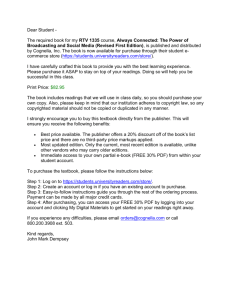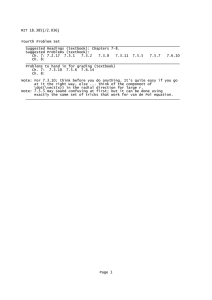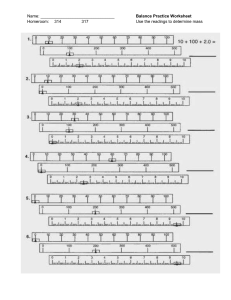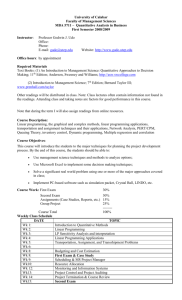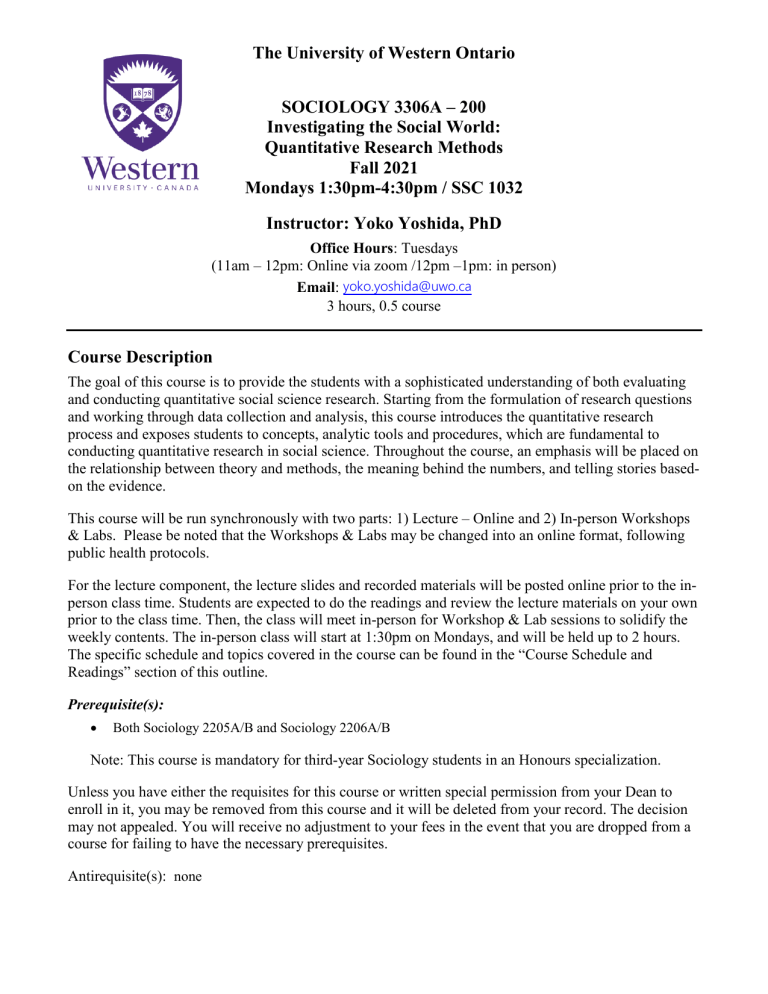
The University of Western Ontario SOCIOLOGY 3306A – 200 Investigating the Social World: Quantitative Research Methods Fall 2021 Mondays 1:30pm-4:30pm / SSC 1032 Instructor: Yoko Yoshida, PhD Office Hours: Tuesdays (11am – 12pm: Online via zoom /12pm –1pm: in person) Email: yoko.yoshida@uwo.ca 3 hours, 0.5 course Course Description The goal of this course is to provide the students with a sophisticated understanding of both evaluating and conducting quantitative social science research. Starting from the formulation of research questions and working through data collection and analysis, this course introduces the quantitative research process and exposes students to concepts, analytic tools and procedures, which are fundamental to conducting quantitative research in social science. Throughout the course, an emphasis will be placed on the relationship between theory and methods, the meaning behind the numbers, and telling stories basedon the evidence. This course will be run synchronously with two parts: 1) Lecture – Online and 2) In-person Workshops & Labs. Please be noted that the Workshops & Labs may be changed into an online format, following public health protocols. For the lecture component, the lecture slides and recorded materials will be posted online prior to the inperson class time. Students are expected to do the readings and review the lecture materials on your own prior to the class time. Then, the class will meet in-person for Workshop & Lab sessions to solidify the weekly contents. The in-person class will start at 1:30pm on Mondays, and will be held up to 2 hours. The specific schedule and topics covered in the course can be found in the “Course Schedule and Readings” section of this outline. Prerequisite(s): • Both Sociology 2205A/B and Sociology 2206A/B Note: This course is mandatory for third-year Sociology students in an Honours specialization. Unless you have either the requisites for this course or written special permission from your Dean to enroll in it, you may be removed from this course and it will be deleted from your record. The decision may not appealed. You will receive no adjustment to your fees in the event that you are dropped from a course for failing to have the necessary prerequisites. Antirequisite(s): none Learning Outcomes At the end of the course, students will be able to: - understand the process of quantitative research in social science; develop a set of quantitative research questions, which are theoretically informed and grounded in existing research; appreciate the relationship among theory, concepts, measures, and analytical design; assess and evaluate best practices in research methods of data collection; apply uni-variate, bi-variate, and multi-variate analysis to produce empirical evidence; and interpret the results of multivariate quantitative data analyses. Required Texts: Textbook: Singleton, R. and B. Straits. 2018. Approaches to Social Research, 6th Ed. Oxford University Press. For the details of the textbook purchase, please visit the UWO bookstore website for this course. https://bookstore.uwo.ca/textbooksearch?campus=UWO&term=W2021A&courses%5B0%5D=200_UW/SOC3306A Weekly reading assignment is listed in “Course Schedule and Readings”. Required supplemental readings: Supplemental readings may be assigned in addition to the textbook. They will be posted on the course website (OWL). Sample Dataset of Instruction: The General Social Survey, Cycle 27: Social Identity (Statistics Canada, 2013) will be used to illustrate examples and concepts taught in the course. A few additional datasets may be introduced to reflect a wider range of sociological research areas, if requested. Statistical Computing: The statistical computing for the course will be done using STATA. STATA is available on computers located in the Social Science computing lab via myVlab (free of charge for the students in this course). In order to access Stata in the lab, students must: (1) have active Western accounts, and (2) have subscribed to “Western Identity Manager” and synchronized their passwords through the “Profile” tab. If you are having trouble gaining access, please call either the SSNDS main office (519-661-2152) or the ITS Help Desk (519-661-3800). There is some lab time set aside during class hours, but you will most likely need to spend a significant amount of your own time. We will go through how to access and use state in the workshop. 2 Method of Evaluation 1. Mid-term Exam: 35% 2. Course Project: Quantitative Research Paper: 65% a. Literature Review/Research Question (20%) b. Final Research Paper (45%) Evaluation Breakdown (Dates and Formats are tentative, and will be finalized in the full draft of the outline) 1. Mid-term exam: 35% Mid-term exam is scheduled on Monday, November 8th. It will take place in-person during the class time. Exam consists of a combination of multiple choice and essay questions and will require knowledge of the textbook, additional assigned readings, and lectures. You are responsible for all the material in the assigned chapters and readings even if this material is not covered in class. Specific time and detail of the format will be announced in class closer to date. 2. Quantitative Research Paper: 65% To demonstrate your knowledge of quantitative research methods, you will be asked to develop a research paper using the Canadian General Social Survey (GSS). It is encouraged to select a research topic which can be addressed by the GSS, Cycle 27, Social Identity (or other cycles of the GSS). This assignment will consists of two components: a) Literature review and formulating a research question – maximum 5 pages (20%) Due on Friday, October 22 at 11:55PM b) Final research paper – maximum 12 pages (45%) Due on Monday, December 6 at 11:55PM The final research proposal builds on the first assignment. You are encouraged to modify the first assignment based on the feedback and use the draft as the first part of your final research paper. Contact Information: Instructor: Email: yoko.yoshida@uwo.ca. Phone: 519 661 2111 ext 85045 Teaching assistant: TBA 3 How to get important course information: For information about the course, please read the course outline carefully and attend the in-person lab/workshop session weekly. Also, check your email and course website for announcements. Overview of Course Schedule (The schedule may change depending on progress.) Week Dates Topic 1 2 September 13 September 20 3 4 6 September 27 October 4 October 11 October 18 October 22 (Friday) October 25 7 8 November 1 November 8 November 15 Introduction/The Nature of Science (S&S Ch. 1&2) Role of theory in quantitative research - The Logic of Scientific Reasoning (S&S Ch. 2 &4) Elements of Research design (S&S Ch. 4) Survey Research Methods – Measures (S&S Ch. 9&5) Thanksgiving Holiday - No Class Survey Research Methods – Sampling (S&S Ch. 9&6) Deadline: Final Research Paper Survey Research Methods – Instrumentation (S&S Ch. 9&10) Reading Break - No Class Mid-term Exam Data Processing and Elementary Data Analysis (S&S Ch.15) Multivariate Analysis I (S&S Ch.16) Multivariate Analysis II (S&S Ch.16 & 17) Research Ethnics (S&S Ch 3) Deadline: Final Research Paper 5 9 10 11 November 22 November 29 December 6 December 6 4 Course Schedule and Readings (The schedule may change depending on progress and public health protocols. Changes will be announced in class as well as on the course OWL site). Week 1: Introduction/The Nature of Science Readings: Textbook Chapters 1&2 Workshop/Lab: Introduction and Discussion: What is sociological research? Week 2: Role of Theory in quantitative research Readings: Textbook Chapters 2 & 4 Workshop/Lab: Discussion on course projects Literature search and literature review (Presentation by a librarian) Week 3: Elements of Research Design Readings: Textbook Chapter 4 Workshop/Lab: Research Hypothesis and Operationalization Explore Datasets (ODESI) Week 4: Survey Research Methods & Measures Readings: Textbook Chapters 9&5 Workshop/Lab: Introduction to STATA and GSS Week 5: Survey Research Methods & Sampling Readings: Textbook Chapters 9&6 Workshop/Lab: Q&A for the Research Proposal Assignment (a) Data processing with STATA I Week 6: Survey Research Methods & Instrumentation Readings: Textbook Chapters 9&10 Workshop/Lab: Workshop on Survey Instrumentation Week 7: Midterm Exam – in-person Week 8: Data Processing and Elementary Data Analysis Readings: Textbook Chapter 15 Workshop/Lab: Uni-variate and Bi-variate analysis with STATA 5 Week 9: Multivariate Analysis I Readings: Textbook Chapter 16 Workshop/Lab: Analyzing relationships with three variables (X, Y, Z) with STATA Week 10: Multivariate Analysis II Readings: Textbook Chapter 16 & 17 Workshop/Lab: Discussion on conceptual and statistical models Introduction to multi-variate analysis with STATA Week 11: Research Ethics and Conclusion Readings: Textbook Chapter 3 Workshop/Lab: Q&A for Final Research Paper 6 Important Policies Policies for Assignment Deadlines Students who are seeking academic consideration for missed work during the semester may submit a self-reported absence form online provided that the absence is 48 hours or less and the other conditions specified in the Senate policy are met. Two important exceptions to this rule: SRAs will not be allowed for final examinations or assessments worth more than 30% of a given course. Students whose absences are expected to last longer than 48 hours, or where the other conditions detailed in the policy are not met (e.g., work is worth more than 30% of the final grade, the student has already used 2 self-reported absences, the absence is during the final exam period), may receive academic consideration by submitting a Student Medical Certificate (for illness) or other appropriate documentation (for compassionate grounds). Please contact an Academic Counsellor of your Faculty. For Faculty of Social Science, see https://counselling.ssc.uwo.ca/connect/index.html. For other Faculty, please consult your own department/faculty. For more information about the SRA policy, please refer to: https://counselling.ssc.uwo.ca/procedures/academic_consideration.html All students pursuing academic consideration, regardless of type, must contact their instructors at the earliest convenience after the end of the period of absence to clarify how they will be expected to fulfill the academic responsibilities missed during their absence. Students are reminded that they should consider carefully the implications of delaying submission of work and are encouraged to make appropriate decisions based on their specific circumstances. Unexcused late assignments will be penalized 5% per day (including weekend days). Please note that computer or internet problems are not an excused circumstance. You are expected to follow good computer practices, including backing up your work. A Note on Plagiarism Students must write their assignments in their own words. Whenever students take an idea from another author, they must acknowledge their debt both by using quotation marks where appropriate and by proper referencing such as footnotes or citations. Plagiarism is a major scholastic offence (the Scholastic Offence Policy can be viewed in the Western Academic Calendar). However, for the final assignment of the research proposal assignment, the use of your own writing from the previous assignment is permitted, in so far as it is from your own work. Plagiarism Checking: All required papers may be subject to submission for textual similarity review to the commercial plagiarism detection software under license to the University for detection of plagiarism. All papers submitted for such checking will be included as source documents in the reference database for the purpose of detecting plagiarism of papers subsequently submitted to the system. Use of the service is subject to the licensing agreement, currently between The University of Western Ontario and Turnitin.com (www.turnitin.com). 7 Policies on Examinations Computer-marked multiple-choice tests and/or exams may be subject to submission for similarity review by software that will check for unusual coincidences in answer patterns that may indicate cheating. Policy on Laptops and other Electronics/Phones in Class: Laptops are permitted in class, but if it is observed that students are on social networking sites such as Facebook or Twitter, they will be told to close the lid and they will not be permitted to use it for the remainder of the class. Be sure that all cell phones are turned off at the beginning of class. Policy on Accommodation for Medical Illness Western’s policy on Accommodation for Medical Illness can be found at www.uwo.ca/univsec/pdf/academic_policies/appeals/accommodation_medical.pdf. Students must see the Academic Counselor and submit all required documentation in order to be approved for certain accommodation: https://counselling.ssc.uwo.ca/procedures/academic_consideration.html Accessibility Options Please contact the course instructor if you require material in an alternate format or if you require any other arrangements to make this course more accessible to you. You may also wish to contact Services for Students with Disabilities (SSD) at 519 661-2111 x 82147 for any specific question regarding an accommodation. Information regarding accommodation of exams is available on the Registrar’s website: www.registrar.uwo.ca/academics/examinations/accommodated_exams.html Scholastic Offences The goal for the course is to learn basic demographic methods and internalize how demographers think about measuring population change. The assignments are a key part of learning how the methods work. It will be helpful to talk about the methods with classmates and this is strongly encouraged. However, it is important to do the problem sets without collaboration. This will help to learn the material and prepare for exams. Scholastic offences are taken seriously and students are directed to read the appropriate policy, specifically, the definition of what constitutes a Scholastic Offence, at the following web site: www.uwo.ca/univsec/pdf/academic_policies/appeals/scholastic_discipline_undergrad.pdf Mental Health Students who are in emotional/mental distress should refer to Mental Health@Western (www.uwo.ca/health/mental_wellbeing/) for a complete list of options how to obtain help. 8
